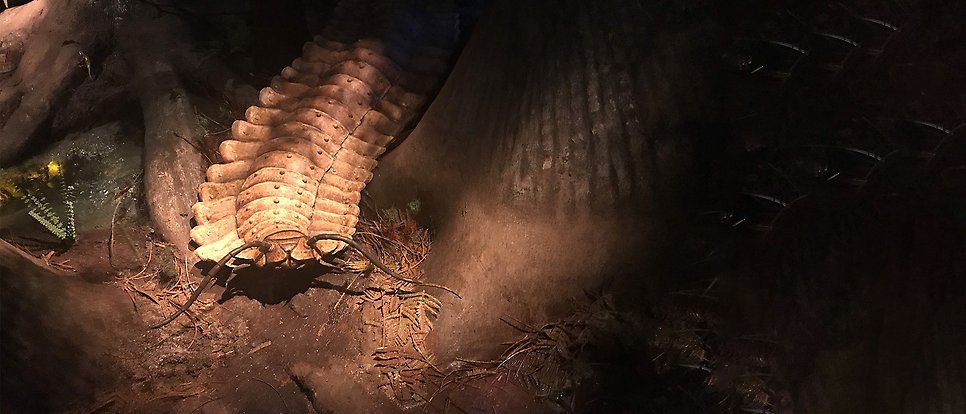Master's Programme in Earth Science – Palaeobiology
120 credits

Are you interested in how life on Earth looked millions of years ago? Do you want to understand how life, climate and the environment have evolved and been influenced by Earth's chemical and physical changes over time? The Master's Programme in Earth Science, specialising in Palaeobiology, combines research in geosciences with the biological sciences to recreate and understand the evolutionary changes that have taken place throughout history.
Autumn 2023 Autumn 2023, Uppsala, 100%, On-campus, English
- Location
- Uppsala
- Pace of study
- 100%
- Teaching form
- On-campus
- Instructional time
- Daytime
- Start date
- 28 August 2023
- Language of instruction
- English
- Entry requirements
-
Academic requirements
A Bachelor's degree, equivalent to a Swedish Kandidatexamen, from an internationally recognised university.
Also required is:
- 90 credits in earth science; or
- 90 credits in biology.
Language requirements
Proficiency in English equivalent to the Swedish upper secondary course English 6. This requirement can be met either by achieving the required score on an internationally recognised test, or by previous upper secondary or university studies in some countries. Detailed instructions on how to provide evidence of your English proficiency are available at universityadmissions.se.
- Selection
-
Students are selected based on an overall appraisal of previous university studies, a statement of purpose and other relevant experience.
- Fees
-
If you are not a citizen of a European Union (EU) or European Economic Area (EEA) country, or Switzerland, you are required to pay application and tuition fees.
- Application fee: SEK 900
- First tuition fee instalment: SEK 72,500
- Total tuition fee: SEK 290,000
- Application deadline
- 16 January 2023
- Application code
- UU-M1853
- Additional information
-
In addition to the general supporting documents, you also need to submit a programme-specific statement of purpose (1 page).
The statement of purpose should provide a clear motivation for the chosen programme and specialisation; include information on your Bachelor's thesis (if any) and its relevance to the programme; and describe other relevant experience, e.g. fieldwork, internships, work experience, previous studies abroad, involvement in a student union or academic societies, communication skills.
Check the application guide for information on how to apply and what other supporting documents you need to submit.
Autumn 2024 Autumn 2024, Uppsala, 100%, On-campus, English
- Location
- Uppsala
- Pace of study
- 100%
- Teaching form
- On-campus
- Instructional time
- Daytime
- Start date
- 2 September 2024
- Language of instruction
- English
- Entry requirements
-
Academic requirements
A Bachelor's degree, equivalent to a Swedish Kandidatexamen, from an internationally recognised university.
Also required is:
- 90 credits in earth science; or
- 90 credits in biology.
Language requirements
Proficiency in English equivalent to the Swedish upper secondary course English 6. This requirement can be met either by achieving the required score on an internationally recognised test, or by previous upper secondary or university studies in some countries. Detailed instructions on how to provide evidence of your English proficiency are available at universityadmissions.se.
- Selection
-
Students are selected based on an overall appraisal of previous university studies, a statement of purpose and other relevant experience.
- Fees
-
If you are not a citizen of a European Union (EU) or European Economic Area (EEA) country, or Switzerland, you are required to pay application and tuition fees.
- Application fee: SEK 900
- First tuition fee instalment: SEK 72,500
- Total tuition fee: SEK 290,000
- Application deadline
- 15 January 2024
- Application code
- UU-M1853
- Additional information
-
In addition to the general supporting documents, you also need to submit a programme-specific statement of purpose (1 page).
The statement of purpose should provide a clear motivation for the chosen programme and specialisation; include information on your Bachelor's thesis (if any) and its relevance to the programme; and describe other relevant experience, e.g. fieldwork, internships, work experience, previous studies abroad, involvement in a student union or academic societies, communication skills.
Check the application guide for information on how to apply and what other supporting documents you need to submit.
About the programme
The specialisation in Palaeobiology is focused on the evolution of life with courses ranging from palaeobiological principles, through to the evolution of organisms to complex vertebrate life forms. This is a mainly research-oriented specialisation, but has applications to careers in geology, particularly the oil industry.
We try to understand how life has evolved over millions of years and how it adapted to constant changes in the environment and climate. We do this by combining traditional fossil studies with modern biological methods. This is mainly a research-oriented specialisation, but has applications to careers in geology.
During the programme, you can expect to:
- understand how life has evolved over millions of years,
- learn how life adapted to constant changes in the environment and the climate,
- combine traditional fossil studies with modern biological methods.
The Department of Earth Sciences at Uppsala University is one of the most comprehensive academic departments of its kind in Europe. Research in Earth Science focuses on subjects that range from the Earth's core to the atmosphere. It focuses on scales from sub-microscopic minerals and fossils to the formation of mountains and oceans, and in time from the formation of the Earth to the processes currently reshaping the planet.
Research in paleobiology includes the evolution of animals in connection with major biological events, especially those of the so-called Cambrian explosion. Moreover, we investigate how different types of microorganisms have evolved and changed in relation to the climate and climate change over a period extending from today until over a billion years ago.
Degree
The programme leads to the degree of Master of Science (120 credits) with Earth Science as the main field of study. After one year of study, it is possible to obtain a degree of Master of Science (60 credits).
Content
The first semester starts with Dynamics of Earth Systems - Global Change. Method courses are also offered in the first semester with Analytical Methods in Earth Science and Applied geoinformatics. The Presentation and Publication course helps you develop your communication skills.
In the second semester, the specialisation focuses on Principles of Palaeobiology, which looks at basic theoretical concepts such as conservation, phylogeny and evolution. Followed by Evolution and development, an advanced course in which biology and palaeontology are combined.
Semester three starts with a course that deals with various key events in the early development of life. It is followed by a project-based course focusing on large vertebrate animals.
The programme concludes with a degree project in the form of an independent project.
Courses within the programme
Learning experience
The teachers in the Master's Programme in Earth Science are experts in their respective fields, giving you up-to-date contact with front-line research in an open and creative educational atmosphere. The teaching consists of a balanced mix of theoretical and practical work providing experience in both research and industry-oriented applications. Excursions, fieldwork and study visits are included in some courses.
Instruction in the Master's programme builds on your experience and knowledge from your previous education. You are expected to actively participate and contribute to the learning environment and take responsibility for your own and others' learning. The teachers are responsible for creating opportunities for active learning at individual and group level. Purposeful and respectful dialogue between teachers and students contributes to the constant improvement and development of courses.
Examination generally includes written exams, complemented by seminar presentations/discussions, project work, laboratory work and field reports.
Career
The Master Programme in Earth Science, specialising in Palaeobiology, provides good opportunities for a postgraduate education with subsequent research career, and sufficient overall knowledge to meet society's needs for qualified earth scientists.
Alumni from the Palaeobiology specialisation work largely within scientific research internationally. Additionally, alumni work at museums or as earth scientists in a broad range of applications.
Our graduates work at, for example, the Swedish Museum for Natural History, the Paleontology museum Uppsala Natural History Museum and even Zinkgruvan AB.
Career support
During your time as a student, UU Careers offers support and guidance. You have the opportunity to take part in a variety of activities and events that will prepare you for your future career.
Is this programme right for you?
Read interviews about the programme.

What people say about the programme
Watch our programme video.

Register your interest
Keep updated about the application process.

Programme syllabus
- Programme syllabus valid from Autumn 2024
- Programme syllabus valid from Autumn 2023
- Programme syllabus valid from Autumn 2022
- Programme syllabus valid from Autumn 2021
- Programme syllabus valid from Autumn 2020
- Programme syllabus valid from Autumn 2019
- Programme syllabus valid from Autumn 2018
- Programme syllabus valid from Autumn 2017
- Programme syllabus valid from Autumn 2016, version 2
- Programme syllabus valid from Autumn 2016, version 1
- Programme syllabus valid from Autumn 2015
- Programme syllabus valid from Autumn 2014
- Programme syllabus valid from Autumn 2013
- Programme syllabus valid from Autumn 2012
Outline
- Outline valid from Autumn 2024
- Outline valid from Autumn 2023
- Outline valid from Autumn 2022
- Outline valid from Autumn 2021
- Outline valid from Autumn 2020
- Outline valid from Autumn 2019
- Outline valid from Autumn 2018, version 2
- Outline valid from Autumn 2018, version 1
- Outline valid from Autumn 2017, version 2
- Outline valid from Autumn 2017, version 1
- Outline valid from Autumn 2016, version 2
- Outline valid from Autumn 2016, version 1
- Outline valid from Autumn 2015
- Outline valid from Autumn 2014
- Outline valid from Autumn 2013
- Outline valid from Autumn 2012, version 2
- Outline valid from Autumn 2012, version 1
Contact
- For programme-specific information, please contact our study counsellor:
- studievagledare@geo.uu.se
- +46 18 471 25 07
- For admissions-related or general information, please contact our applicant support team:
- masterprogrammes@uu.se
- Programme Director Abigail Barker:
- abigail.barker@geo.uu.se
- +46 18 471 25 52
Students
As a student you will find information about your studies in the student gateway.
